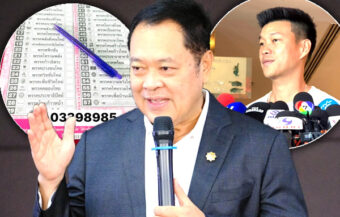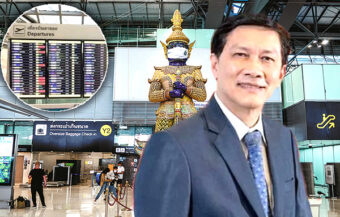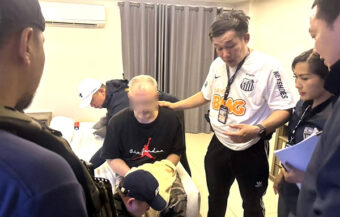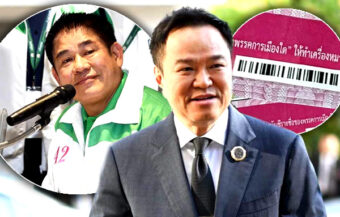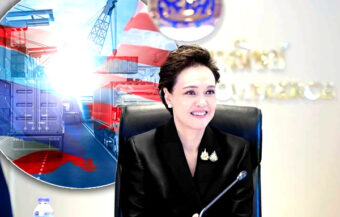Pheu Thai and the People’s Party are negotiating an Orange-Red alliance to elect Chaikasem Nitisiri as Thailand’s next Prime Minister amid political turmoil and uncertainty following the ouster of PM Paetongtarn Shinawatra by the Constitutional Court.
The Pheu Thai Party and its de facto leader have begun the process of creating an Orange-Red pact to elect the next Prime Minister. The move leverages alignment with the People’s Party’s calls for a short-lived administration that would focus on constitutional reform and then hand power back to the people in a General Election. The resulting policy was clearly highlighted on Friday by the Bhumjaithai Party and Anutin Charnvirakul’s move to seize the initiative and form a government with the support of the People’s Party, comprising over half the MPs. However, on Saturday, the party and its top leaders confirmed that no pact or agreement was in place. It will formally meet the Pheu Thai Party on Sunday and will decide on its position on Monday evening. The vote on Thailand’s 32nd Prime Minister is expected on Wednesday in parliament before the House of Representatives.
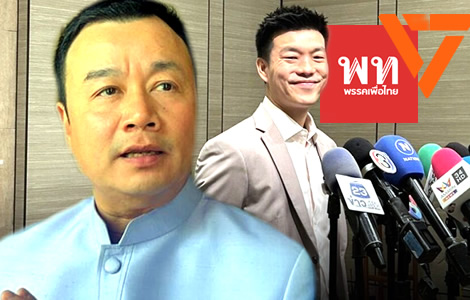
The People’s Party is set to hold a pivotal meeting this Monday, just two days before Parliament casts its vote to elect Thailand’s next Prime Minister. The stakes could hardly be higher. Although party leader Natthaphong Ruangpanyawut has confirmed that no agreement has been reached with any political faction, discussions are intensifying behind the scenes. This decision, set for September 1st, may determine not only the leadership of the country but the shape of its political future.
Pheu Thai meets with the People’s Party to gain support for Chaikasem Nitisiri ahead of the critical vote
Pressure is mounting on all sides. On Saturday morning, Progressive Movement leader Thanathorn Juangroongruangkit met with Pheu Thai patriarch Thaksin Shinawatra. While no details were officially released, the meeting was quickly followed by a significant announcement.
Later that same day, the Pheu Thai Party formally approached the People’s Party, requesting support for its Prime Ministerial nominee, Chaikasem Nitisiri. This move signals a last-ditch effort to secure enough votes to push through a government amid deepening uncertainty.
To follow through on the overture, Pheu Thai Secretary-General Surawong Thienthong is scheduled to visit People’s Party headquarters on Sunday. According to sources, the purpose is to present Chaikasem’s candidacy in person and make the party’s intentions clear.
However, the People’s Party has remained non-committal. Natthaphong insists that only official channels matter. Private negotiations or leaks to the press will not be treated as serious offers.
Meanwhile, the Bhumjaithai Party has made a dramatic pivot. Only a day after denying any ambition, party leader Anutin Charnvirakul threw his hat into the ring. His sudden reversal follows the Constitutional Court’s disqualification of Paetongtarn Shinawatra on Friday.
The ruling was based on a June 15 phone call she held with Cambodian Prime Minister Hun Sen. Judges cited the communication as improper and in violation of constitutional standards. As a result, Pheu Thai’s leading candidate was removed from contention, setting the stage for new contenders.
Anutin agrees to People’s Party demands for a short-term transitional government and constitutional referendum
Interestingly, Anutin claims he has accepted the core demands of the People’s Party in exchange for its support. These include forming a transitional government that resigns within four months, dissolving Parliament and passing a referendum to initiate the drafting of a new constitution.
Although the offer appears generous, there is widespread scepticism. Notably, critics have accused Bhumjaithai of blocking constitutional reform for over two years. Their role in stalling key legislative changes since August 2023 has drawn sustained criticism from reformist factions.
Moreover, concern surrounds the role of the Senate, which many believe is still aligned with Bhumjaithai interests. Although Anutin and his allies deny having control over the upper house, Pheu Thai and People’s Party figures are unconvinced.
They cite past Senate behaviour and question whether reform legislation could survive in such an environment. This tension could become a sticking point in negotiations.
People’s Party demands sincerity and transparency as tensions rise over proposed government and reform
The People’s Party has emphasised that any agreement must be sincere, enforceable and rooted in public transparency. “This is not about promising anything just to get into power,” Natthaphong said. He reiterated that past betrayals by political allies have made the party cautious. Therefore, any future commitments must be concrete, specific and backed by clear timelines.
Pheu Thai, for its part, has proposed a six-month government to oversee the reform process. However, Natthaphong views the four-month timeline as more realistic and appropriate.
Importantly, the Constitutional Court is expected to issue a ruling on September 10th regarding the referendum process. That decision may impact the timeline for both constitutional reform and the next general election.
Tensions are rising between the parties. Natthaphong firmly denied rumours that his party had agreed to support Anutin in exchange for eight cabinet positions. He also rejected speculation that secret talks were already underway.
“We will only recognise formal negotiations,” he stated, adding that unofficial claims were merely tactics to manipulate public perception. He stressed that no vote has yet been cast, and the People’s Party remains open to all candidates—provided they meet its strict terms.
Khao Kradong land scandal and Senate probe raise concerns over Bhumjaithai coalition’s reliability
During the same press conference, a notable moment occurred when lawyer Phatthapong Suphaksorn presented Natthaphong with a photo of a controversial land deed.
The image pertained to the Khao Kradong land scandal involving the Bhumjaithai Party. Suphaksorn urged him to think carefully before endorsing Anutin, warning that unresolved legal cases could jeopardise government integrity.
Although Anutin claims his government would dissolve itself within four months, many are unconvinced. Wan Muhammad Noor Matha, the Speaker of the House of Representatives and a senior figure in the Prachachat Party, warned on Saturday that a six-month timeline is more likely.
Speaking at an extraordinary general meeting in Yala, Wan Nor stated he expected Parliament to be dissolved well before mid-2026. Importantly, he favoured an Orange-Red pact—implying a bloc between Progressive and Pheu Thai parties—over an Orange-Blue alignment with Bhumjaithai.
Wan Nor also cited the Senate collusion probe and the ongoing Khao Kradong scandal as key barriers to forming any credible coalition with Bhumjaithai.
Significantly, the House Speaker was installed in 2023 by a then Pheu Thai–Move Forward Party alliance before a Memorandum of Understanding (MOU) for a new government fell apart due to opposition from an unelected Senate installed by the former junta regime.
Time-sensitive vote looms as Prachachat Party warns of obstruction and maintains distance from Bhumjaithai
The present Senate is equally controversial. It is under investigation by the Election Commission with preliminary indications of massive collusion linked with Bhumjaithai Party figures. Furthermore, the case has already become a special investigation with the Department of Special Investigation (DSI), involving money laundering and secret society charges. Additionally, multiple investigations into the Khao Kradong land controversy and key Bhumjaithai Party figures continue to raise searching questions.
Worawit Baru, deputy leader of the Prachachat Party, echoed those concerns. He emphasised that his party would not align with Bhumjaithai, citing its long history of obstruction and recent investigations. He added that parties with “black-and-white politics” are no longer compatible with reformist goals.
Still, time is running out. The Prime Ministerial vote is scheduled for Wednesday, September 3rd. According to Natthaphong, the People’s Party will use its full bloc of 143 votes. However, its final decision will only be made after Monday’s internal meeting. Until then, all options remain on the table.
Despite the flurry of activity, the People’s Party is attempting to maintain discipline. Natthaphong noted that past coalition deals collapsed due to betrayal and political manoeuvring.
This time, he said, the party will move as one. It will only endorse a candidate who commits in writing to the party’s roadmap—especially the call for a new constitution.
Natthaphong rejects secret alliances and insists that people’s power remains central to the upcoming vote
Additionally, Natthaphong addressed rumours about a secret alliance involving Thaksin and Thanathorn. He dismissed these reports, saying that only those who present their case formally to the party leadership will be taken seriously. The party leader, known as ‘Teng’, reiterated that his goal remains simple. In short, it involves returning power to the people through new elections and a fresh political mandate.
He also rejected any possibility of supporting a return of General Prayut Chan-o-cha. If such a nomination were to surface, Natthaphong insisted, the People’s Party would vote against it unanimously.
Pheu Thai rattled by PM’s ouster. Risks complacently assuming the Premiership of Chaikasem Nitisiri
Anutin plays his hand for the Premiership, but only one thing is sure. Thailand is in a political crisis
PM Paetongtarn Shinawatra ousted by Constitutional Court, collapsing Thai government over audio clip
By Monday evening, the political landscape may be far clearer. Or it may plunge into even deeper uncertainty. Either way, the People’s Party appears to hold the balance of power. Its decision has significant implications for political stability and, therefore, economic prosperity in Thailand.
Join the Thai News forum, follow Thai Examiner on Facebook here
Receive all our stories as they come out on Telegram here
Follow Thai Examiner here
Further reading:
Pheu Thai rattled by PM’s ouster. Risks complacently assuming the Premiership of Chaikasem Nitisiri
PM Paetongtarn Shinawatra ousted by Constitutional Court, collapsing Thai government over audio clip
Prime Minister Paetongtarn Shinawatra a no-show at cabinet and an appointment with Pheu Thai MPs



